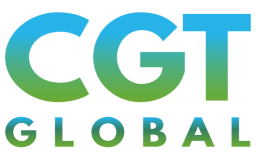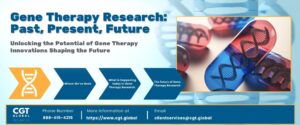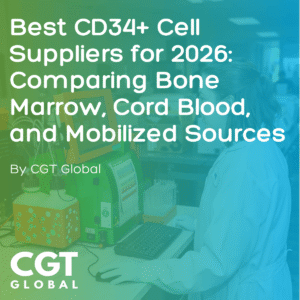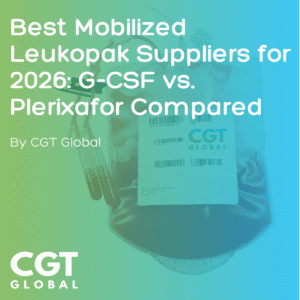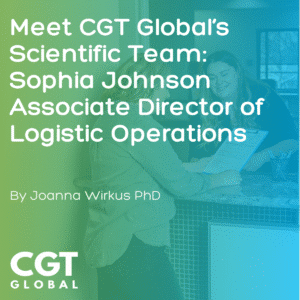Gene Therapy Research: Past, Present, Future
By: Joanna Wirkus
Gene Therapy: Where We’ve Been:
The Human Genome Project concluded in 2003 after 13 years of effort aimed at mapping the entire Human Genome and improving DNA sequencing technology at large. This milestone set the foundation for a better understanding of the drivers of disease at the molecular level. Since then, scientists have been harnessing the power of genetics and genomics to revolutionize therapeutic approaches for the treatment of diseases. CGT Global has been proud to ally with investigators propelling the development of innovative medical interventions in the evolving field of gene therapy over the last 15 years.
In 2017, the first CAR-T cell therapy, Kymriah, was FDA approved in the US. This revolutionary gene therapy genetically reprograms a patient’s own T cells to express chimeric antigen receptor (CAR), leading them to destroy cancerous cells in the blood or lymphatic system. Unlike chemotherapy, which destroys all rapidly dividing cells in the body, gene therapy is a more targeted approach to treating cancer in a less damaging way.
What is gene therapy?
The central dogma is the core of cell biology and behavior. DNA is transcribed into RNA and RNA is translated into proteins. The activity of genes can be up regulated or down regulated through numerous mechanisms along the central dogma starting with epigenetic regulation to post-translational modification. Gene therapy alters gene activity in a systematic way to cure or treat a disease. This can be accomplished by:
- Adding a new functional gene
- Spinal Muscular Atrophy is a devastating disorder where infants begin to develop muscle weakness and eventually paralysis. The gene therapy treatment Zolgensma was approved by the FDA in 2019 to stop disease progression by introducing a functional SMN1 gene, saving the child from disability.
- Replacing the faulty gene
- Individuals diagnosed with beta thalassemia major experience profound anemia requiring blood transfusions due to a faulty gene for adult hemoglobin production (BCL11A). The FDA approved, one-time treatment Casgevy uses CRISPER/Cas9 technology to replace the BCL11A gene in blood stem cells ex vivo (outside the body). After this treatment, 90% of patients did not need a blood transfusion for up to a year after treatment.
- Silencing the faulty gene
- Another type of gene therapy silences faulty genes that make dysfunctional proteins. The rare disorder transthyretin amyloidosis leads to misfolded and toxic transthyretin proteins. As a result, patients can experience nerve damage and organ failure. The FDA approved RNA therapy, Patisiran, uses small interfering RNA (siRNA) to target and degrade the mRNA for the transthyretin protein. This treatment silences the faulty gene’s activity thereby improving patients’ symptoms and quality of life.
What is happening today in Gene Therapy Research:
According to the American Society of Gene + Cell Therapy:
- There are currently over 30 approved gene therapies around the globe.
- Gene therapies have been designed for over 20 different diseases.
- Top indications for gene therapy are blood cancers such as leukemia, lymphoma, and multiple myeloma.
- More than 2,100 gene therapies are under development at this time, including those that have not yet been tested in humans, and those that have passed clinical testing are filing to be approved as treatments with regulatory authorities.
- While malignancies continue to be the top focus for the development of gene therapy treatments, neurological, metabolic, and musculoskeletal conditions are gaining attention for new areas of investigation.
The future of Gene Therapy Research:
Science and medicine stand at a major intersection of transformational technology especially as innovations including CRISPR, base editing, AI and deep learning continue to push the field of gene therapy forward. Optimizing the balance between the cutting-edge and the “safe-and-effective” is of paramount importance to the many patients living with life-limiting conditions who stand to benefit from gene therapy.
As modern medicine advances towards a new paradigm by engineering biomolecule behavior, important technical hurdles must be overcome.
- Skill: Scalable cell and gene therapies are only attainable with a workforce with the methodological expertise to deliver safe, consistent, and quality cell-based medicines. CGT Global’s technicians are laser-focused specialists in the science of cell collection, processing, and delivery.
- Space: Few places are properly equipped and certified to meet strict regulatory requirements for the manufacture of gene therapy products. With our specialized laboratories, we have the rare, yet necessary, capability to manufacture and store cells for gene therapy products.
- Time: The time it takes to develop and commercialize these new treatments is a major barrier to delivering potentially curative treatments. At CGT Global, our cell shipping logistics experts can tackle time-related bottlenecks and reliably deliver necessary starting materials for your experiments. With the right samples at the right time, we are accelerating clinical trials and shortening time-to-market for new therapies.
At CGT Global, we are committed to driving progress in gene therapy research. With our expertise in providing customizable cell products, cells, and CAR-T technology, CGT Global is committed to improving patient access to these life changing treatments by accelerating the preclinical and clinical research pipeline. Together, we can unlock the full potential of gene therapy and deliver hope to millions around the globe.
Learn More
Discover how CGT Global is revolutionizing gene therapy research and advancing the future of healthcare. Visit www.cgt.global or contact us at 530-303-3828 today to explore partnership opportunities and learn how we can accelerate your journey in gene therapy innovation.
Citations:
Quarterly Gene, Cell, and RNA Therapy Landscape Report | ASGCT – American Society of Gene & Cell Therapy https://www.asgct.org/publications/landscape-report.
